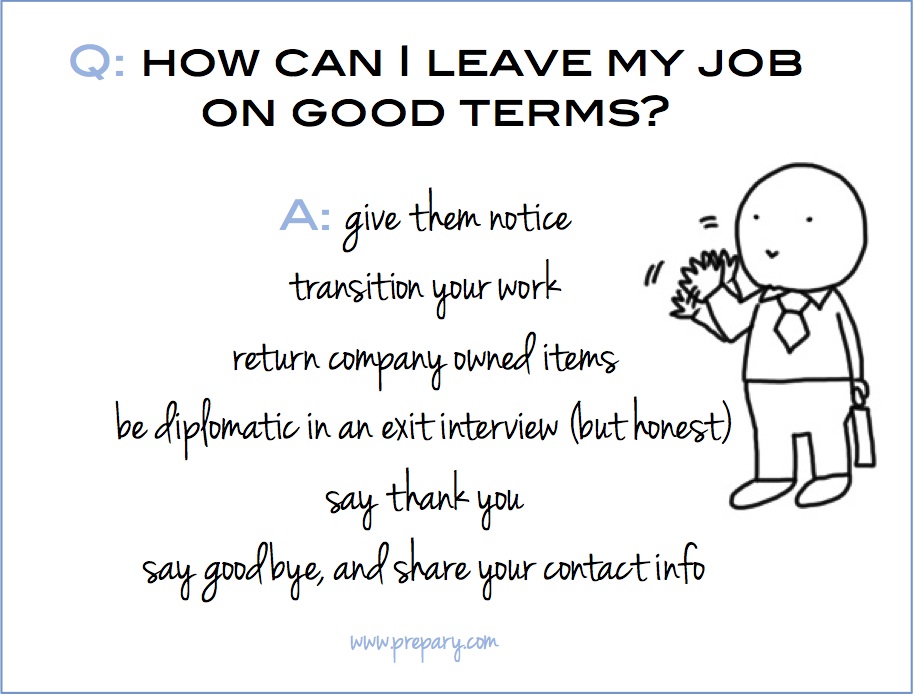If you’re in your job search, the end goal is to be able to quit your current job (if you have one). Giving your notice can be really tough (will cover that in a future post) but people also wonder what to do on your last day and how to leave a job in general. What are the important steps? How can you leave a job on good terms? All good questions.
I’ve seen many people leave companies. Some did so on good terms, some on bad terms, some on ok terms. Here are some tips to make sure you fall into that first bucket and keep those connections strong.

1. Give proper notice
I think this is the most important thing out of the broader list. Though some companies won’t necessarily want you to stay after you give notice, the right thing to do is to offer a minimum of 2 weeks. Anything you can offer beyond 2 weeks, is icing on the cake. 3 weeks is seen as very generous and anything over that borders on too much (but why not offer if you are ok with it and it works with your schedule).
2. Tie up any loose ends and transition your projects
Equally important, is to make sure you don’t leave anyone or anything hanging. If you have projects you can wrap up, wrap them up and finish them off. If you’re leaving certain things or projects mid-way explain this to your manager and ask who you should hand the project off to. It’s important that after you’re gone, someone can easily pick up your work (or at least you’ve given the proper info for them to do so).
Leave a list for your team with your personal contact information and any other info that will be helpful to them once you are gone (i.e. where something is located on a shared drive, etc). That way, if they really need to reach you, they can.
3. Return any company-owned items
Obviously you don’t want to accidentally steal things from the company, especially technology. It’s easy to forget certain things but make sure you make an effort to return anything such as your company phone, access card, desk materials etc. to the right person. Sometimes this will be taken care of for you and you won’t need to take the initiative, but it’s still worth mentioning.
4. Connect with your HR team to see what they need from you and what you need from them: exit interviews, benefits implications, etc.
There are some offborading items best handled by your HR team so be sure to touch base with them. You’ll definitely want to know how leaving your job affects your health benefits, 401k, etc. There may be certain things your HR team can share with you that will help ensure a smooth transition.
In some cases, they may also want to conduct an exit interview where you can give feedback on the company. While you never want to “trash” the company or specific people, don’t be afraid to be constructive in an exit interview. This can actually enable the company to know about certain issues and potentially make changes.
5. Thank your manager and team
Even if there were ups and downs, highs and lows, that doesn’t mean you shouldn’t thank your team for all they’ve done for you during your time at the company. Whether it’s writing a thank you note, an email, making a personal visit, or a phone call, thank the people you’ve worked closely with and plan to stay in touch.
Your former team will end up working at lots of different companies over the course of their careers and it’s likely you’ll cross paths again.
6. Say goodbye – and share your contact info
You’ll probably want to let a broader group of people know you are leaving and in that case it is ok to send a goodbye email. Unless you work for a really small company, it’s probably not appropriate to send a note to the entire company, but instead better to send the note to those you’ve worked with in some capacity.
Share your contact information with them so you’ll be able to keep in touch once you lose that company email and phone number. Also connect with the people you’ve worked with on LinkedIn (if you haven’t already) so that you can keep in touch “from a distance” and see what people are up to as the years pass.
Doing these things (and hey, there are probably others I’ve missed) will enable a smooth transition out of a company.
There are so many reasons to stay on good terms with an employer. Whether you had a great experience working there or not, there is a lot of value in leaving on great terms.
A lot of people automatically think “oh no, they’re going to hate me” when they give their notice and quit. The important thing to remember is that people quit all the time, and it’s not personal. You have every right to do what’s best for you in your own career. Most employers will totally understand that, and while they may be disappointed, it shouldn’t ruin the relationship.
Would love to hear some of your stories and thoughts as well. Did you leave a company on great terms? Leave some comments and let us know!





